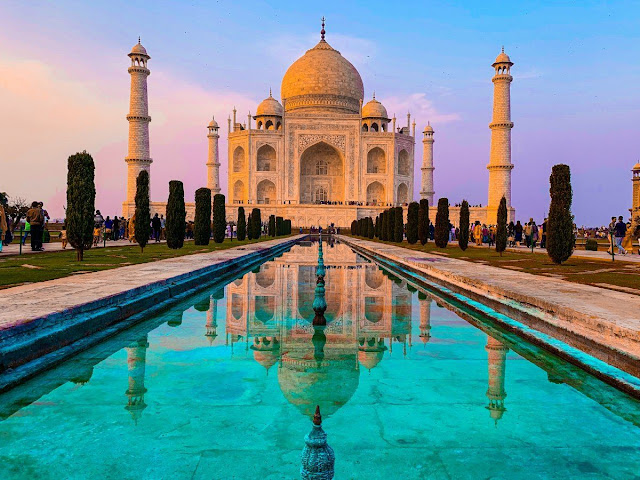 |
| Tajmahal, Agra |
The Taj Mahal, located in Agra, Uttar Pradesh, is one of the most iconic monuments in the world and a UNESCO World Heritage Site. Built by Mughal Emperor Shah Jahan in memory of his beloved wife Mumtaz Mahal, it stands as a symbol of eternal love. Here’s a detailed overview of its history and a suggested day-by-day tour plan to explore the monument and its surroundings.
History of the Taj Mahal
-
Construction:
- Commissioned in 1632 after the death of Mumtaz Mahal.
- Completed in 1648, with the surrounding gardens and structures finalized in subsequent years.
- Built by over 20,000 artisans, with architects led by Ustad Ahmad Lahauri.
-
Architecture:
- A masterpiece of Mughal architecture, blending Persian, Islamic, and Indian styles.
- Made of white marble inlaid with precious and semi-precious stones like jade, lapis lazuli, and onyx.
- Features a central dome, four minarets, intricate calligraphy, and floral motifs.
-
Purpose:
- Built as a mausoleum for Mumtaz Mahal and later served as the tomb for Shah Jahan himself.
- The Yamuna River flows behind it, adding to its scenic beauty.
-
Significance:
- Represents Shah Jahan’s love for Mumtaz Mahal.
- Symbol of India's rich architectural and cultural heritage.
Day-by-Day Tour Plan
Day 1: Arrival in Agra
- Evening Check-in: Arrive in Agra via train or car. The Taj Mahal is approximately:
- 3-4 hours drive from Delhi.
- 2-3 hours train ride from Delhi via Gatimaan/Shatabdi Express.
- Sunset View: Visit Mehtab Bagh, located across the Yamuna River, for a breathtaking view of the Taj Mahal at sunset.
Day 2: Explore the Taj Mahal
-
Early Morning Visit:
- Enter at sunrise to experience the Taj Mahal in its most serene and magical light.
- Explore the main mausoleum, gardens, reflecting pools, and minarets.
-
Afternoon:
- Visit the Agra Fort, a UNESCO World Heritage Site, located about 2.5 km from the Taj Mahal. Learn about the Mughal dynasty's history.
- Enjoy a local meal and explore Agra's markets for souvenirs like marble inlays and handicrafts.
-
Evening:
- Witness the Taj Mahal during sunset from its main gate area, as it radiates a golden hue.
Day 3: Nearby Attractions
-
Fatehpur Sikri:
- Located about 40 km from Agra, this former Mughal capital is another UNESCO World Heritage Site. Highlights include the Buland Darwaza and Jama Masjid.
-
Itimad-ud-Daulah’s Tomb:
- Also known as the "Baby Taj," this mausoleum is considered a precursor to the Taj Mahal in architectural style.
-
Shopping and Farewell:
- Explore Agra's bustling markets for authentic Petha (a local sweet), marble crafts, and textiles.
- Departure to Delhi or your next destination.
Travel Tips
- Tickets: Purchase entry tickets online in advance to avoid long queues.
- Best Time to Visit: October to March for pleasant weather.
- Taj Mahal Timings: Open from sunrise to sunset, closed on Fridays.
- Guides: Hire a certified guide for historical insights.
- Photography: Use designated photo points, but drones are prohibited.
The Taj Mahal offers an unforgettable experience of love, beauty, and history. A carefully planned visit will let you soak in its magnificence and explore the rich heritage of Agra.
 |
| Tajmahal,Agra |




No comments:
Post a Comment